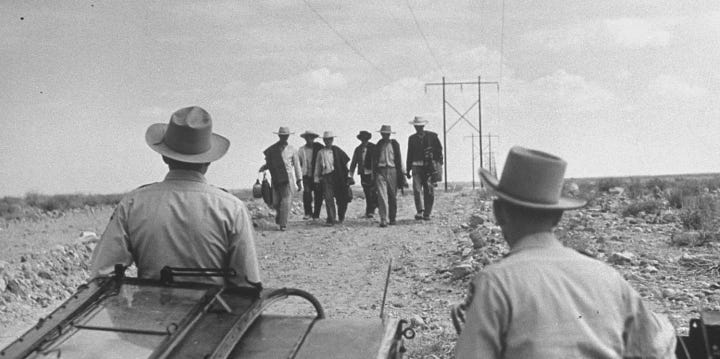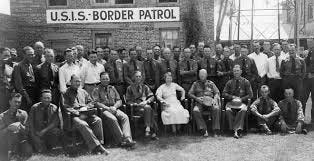It’s 106 degrees in the shade, and the shade is barely more than a smear of heat against a sun-bleached highway sign. A few miles outside of Marfa, between a tomato farm and the infinite beauty of West Texas, I find myself pulled over at a Border Patrol checkpoint. The usual questions. The usual nods. And then I see him.
The agent looks like he’d be instantly harassed if he were passing through without a badge. Dark hair slicked under a dusty green cap, skin the color of the earth itself, eyes ringed with fatigue that doesn’t come from just the heat. He doesn’t smile. Doesn’t even scowl. Just waves me through like he’s done a thousand times before. And maybe he has.
Good thing I don’t have a “Z” in my name.
I came to West Texas looking for something—maybe the truth, maybe a story, maybe just cold beer and Ramona’s legendary burritos. What I found was a bitter paradox that sticks in your throat like dry mesquite smoke. At every checkpoint, in every patrol truck, almost all of the men and women standing guard on America’s southern edge are visibly Latino. Brown skin policing brown skin. Spanish spoken behind mirrored aviators. Mexican blood defending an imaginary line drawn in Washington.
The U.S. Border Patrol was formally established in 1924, born out of Prohibition-era anxieties and a growing national obsession with controlling the southern frontier. Originally tasked with stopping alcohol smugglers and Chinese immigrants, it evolved into a militarized arm of immigration enforcement, particularly along the vast, sun-scorched stretches of West Texas. In places like Marfa, Van Horn, and Presidio—where opportunity is scarce and the nearest decent paycheck might be two hours away—the Border Patrol offers one of the only stable, government-backed jobs around. Good salary, federal benefits, a pension. For many young men and women—often Latino, often local—it’s not about ideology; it’s about survival. A job in green means health insurance, a future, a way to stay rooted in the place you love, even if it means standing guard at a line drawn by someone else hundreds of years ago.


Under the Trump administration, the line between immigration enforcement and constitutional overreach has blurred in dangerous ways. ICE and Border Patrol agents—already armed with sweeping powers in the so-called “Constitution-free zone” within 100 miles of any U.S. border—are now emboldened to operate with near-impunity. Warrantless searches, detaining individuals without probable cause, targeting activists, journalists, and even U.S. citizens based on ethnicity or political beliefs. Legal norms have crumbled as checkpoints deep inside American territory transformed into tools of intimidation rather than security. Families have been torn apart, children caged, and asylum seekers treated as criminals. The Constitution, that supposedly sacred document, has been suspended—not officially, but in practice—under the guise of national security by a New York billionaire who couldn’t care less about ordinary Americans.
And the men in green are left to carry out orders that many of them privately admit feel less like law enforcement and more like a political purge.
Later, over greasy tacos and cold yellow bellies in a nameless taqueria with plastic chairs, I sit down with a few of these ghosts of the border. They won’t let me use their names. Won’t let me record. But they talk. God, do they talk.
“My mom cried when I got the job.”
That was the first thing one of them tells me. He’s in his early 30s, West Texas born and bred. His father picked lettuce in the fields around Las Cruces. His mother cleaned houses in Sunland Park. When he told them he was going to wear the green uniform, his mother wept—not with pride, but something more complicated.
“She said, ‘You’re gonna be arresting your own people.’ I told her, ‘No, Ma, it’s not like that.’ But... sometimes it is.”
He doesn’t look me in the eye when he says it. Just pokes at his food.
“Some of them, the people we catch—they look like my uncles. My cousins. Hell, one guy had the same last name as me. We’re from the same village in Zacatecas.”
He pauses.
“And I still had to cuff him.”
“There’s a lot of self-hate in the job.”
Another agent. Short, stocky, eyes like obsidian. His Spanish is flawless. He switches between English and Spanish depending on the story.
“You spend your whole life trying to prove you belong. That you’re more American than apple pie. Then you put on the uniform and suddenly people on both sides hate you.”
He leans back, takes a swig of beer.
“Mexicans think you’re a traitor. White folks still don’t trust you. It’s like being the bastard of both worlds. You don’t belong to either.”
I ask him why he keeps doing it.
“I’ve got three kids. I want them to go to college.”
Then he shrugs.
“When you’ve been invisible your whole life, it feels good to be the one holding the flashlight.”
“We talk about it, but never really say it out loud.”
There’s a weight in their words. Not shame, exactly. Something closer to weariness. A quiet reckoning. They know the irony. They live it. They joke about it in the locker room—call themselves “La Migra 2.0.” They swap stories about catching people who, but for a twist of fate, could’ve been them. It’s gallows humor, the kind that keeps you from losing your damn mind.
One agent tells me about a teenage girl they found in the brush near Sierra Blanca. She was dehydrated, alone, crying for her mother. She was 14. She reminded him of his niece.
“I gave her my water. Let her sit in the AC. Told her it was gonna be okay, even though I didn’t believe it.”
He sighs.
“We processed her. Sent her to a shelter. That’s all I know.”
What they don’t teach you in the news is that the border isn’t a wall. It’s not a line in the sand or a fence or a speech about sovereignty. The border is a mirror. And for these men—sons of immigrants, brown men in green uniforms—it reflects a painful duality. They’re the gatekeepers of a country that often treats them like second-class citizens. The defenders of a system that would’ve labeled their parents “illegals.”
It’s a cosmic joke with no punchline. They wear the uniform of authority, but carry the weight of contradiction. They are, in every sense of the word, border men—caught between two worlds, two cultures, two versions of America.
“You think we like doing this?”
The last agent I talk to is older. Maybe 50. He’s got the grizzled look of someone who’s seen too much—drug mules, dead bodies in the desert, children in cages.
“I’ve been doing this twenty years. I’ve seen it all. And I’ll tell you something: it doesn’t get easier. You grow numb. Then you hate yourself for being numb.”
He tells me about a time he found a family—a mother and two kids—huddled under a mesquite tree. They were near death. He saved their lives. Gave them water. Called in a medic. Then watched them get shipped off to a holding facility in El Paso.
“I kept thinking... if that was my sister and her kids, what would I want someone to do?”
He finishes his beer, pushes the bottle aside.
“But I’ve got a mortgage. I’ve got a pension. And this country doesn’t make it easy to walk away.”
Back on the road, the sun dips low behind the mountains, setting the desert on fire with that blood-orange glow you only get out here in West Texas. I pass another checkpoint. Another brown face beneath a green hat. Another man with a “Z” in his last name.
And I can’t help but think: the line isn’t just in the sand. It’s in their hearts. In their homes. In the very fabric of their lives. They are the border. Living proof of America’s most uncomfortable truth.
That even the walls we build sometimes wear the faces of the very people we’re trying to keep out.
CPJ | 24 July’25 | Marfa, TX






